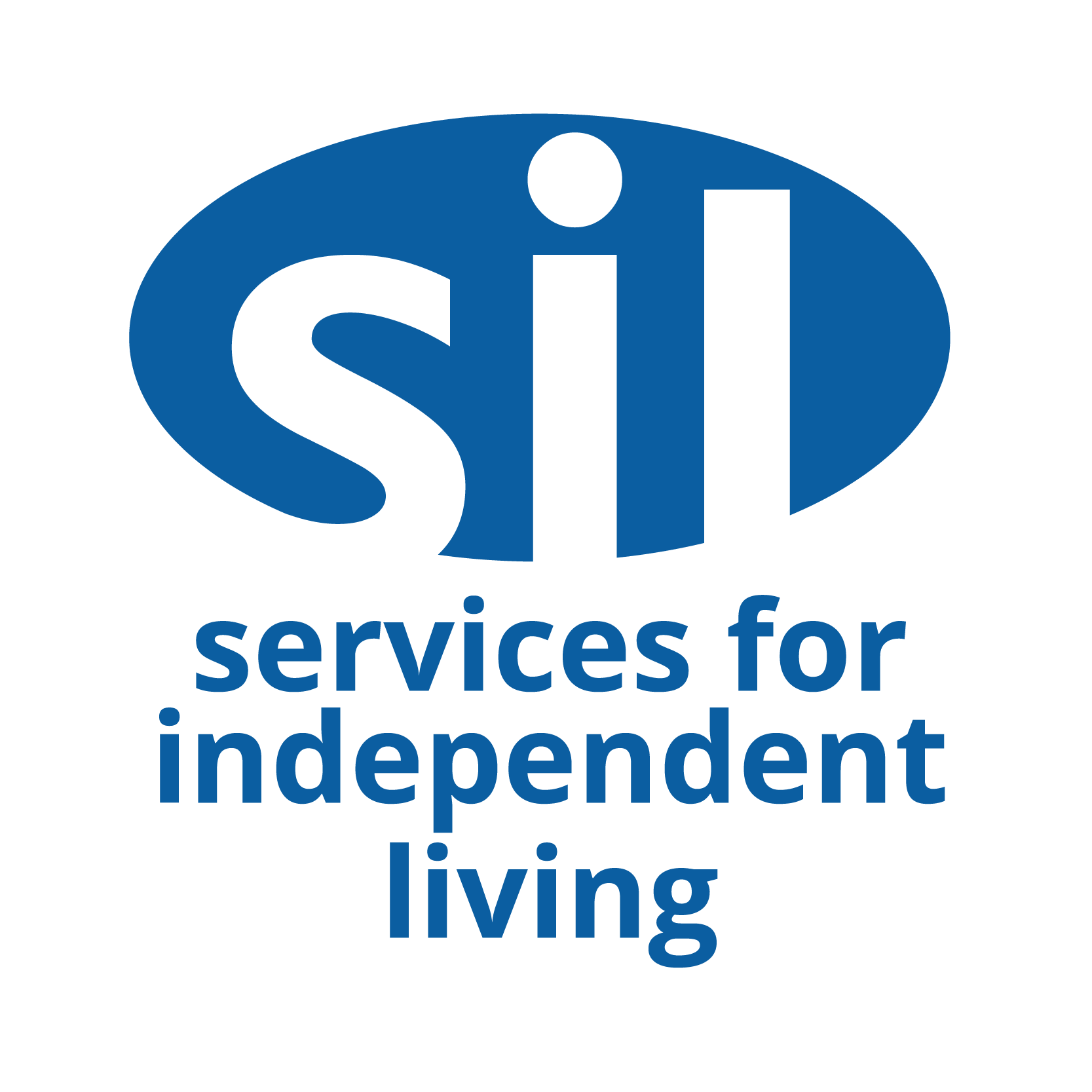Mental Health and Debt Advice 2021 – Money Saving Expert
https://www.moneysavingexpert.com/content/dam/mse/downloads/mentalhealthguide-April-2021.pdf
The MoneySavingExperts Martin Lewis, Jenny Keefe & Marianne Curphey have written a guide with help, info, guidance and support for individuals and carers.
https://www.moneysavingexpert.com/credit-cards/mental-health-guide/
The Big Message throughout this guide is “NO DEBT IS UNSOLVABLE”
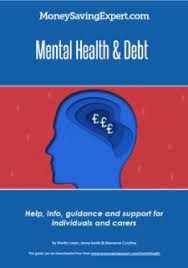
Fraud Advice – Phishing and Smishing
Suspicious text message (smishing)
You can forward a suspicious text message from your phone to Action Fraud free of charge by sending it to 7726. This enables your provider to identify the origin of the text and take action. If you’ve been a victim of a smishing fraud, then you also need to report it to Action Fraud by calling 0300 123 2040, or by using their online form.
Suspicious email (phishing)
If you have received an email which you’re not quite sure about, forward it to the Suspicious Email Reporting Service (SERS) report@ phishing.gov.uk. It will go to the National Cyber Security Centre who will analyse the suspect email and any websites it links to and use any additional information you’ve provided to look for and monitor suspicious activity. If you’ve been a victim of a phishing fraud, then you also need to report it to Action Fraud by calling 0300 123 2040, or by using their online form.
Learning from local Covid-19 Outbreaks
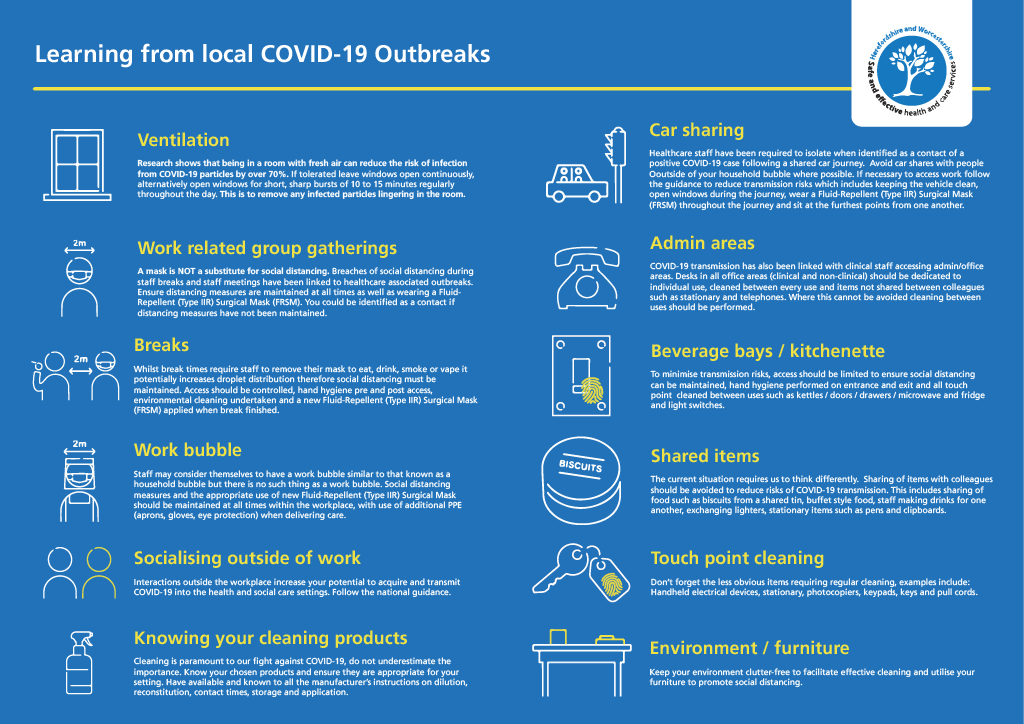
| Be Aware and Stay Vigilant COVID-19 Vaccination Scam |
|---|
| There have been reports of a new scam where a person receives a text saying they need to book a vaccination appointment and it takes them to a fake NHS form which then asks for their bank details to prove their identity. The NHS will never ask for banking information. There is a texting scam leaflet you can download here: MailScanner has detected a possible fraud attempt from “lnks.gd” claiming to be https://cfa.nhs.uk/resources/downloads/fraud-awareness/covid-19/COVID-19_SMS_and_Text_Message_Scams.pdf The scam has been reported in the media here: MailScanner has detected a possible fraud attempt from “lnks.gd” claiming to be https://www.express.co.uk/life-style/science-technology/1378158/NHS-Covid-19-Vaccination-Vaccine-Appointment-Pfizer-BioNTech-Text-Scam-How-To-Avoid |
| MOTs must be booked as normal during lockdown |
|---|
| The Government’s MOT centre and tester guidance makes clear MOT centres can stay open during the national lockdown in England, the temporary lockdown in Scotland, and all of Wales in alert level 4 (lockdown). This means vehicle owners must book an MOT as normal if their MOT is due from 1 August 2020. There is no extension in this lockdown. Guidance for vehicle owners |
Herefordshire Residents told to STAY AT HOME now as COVID-19 case rates rise.
This information comes after a sharp increase in COVID-19 cases across the country, including Herefordshire, in recent weeks.
STAY HOME, STAY SAFE
Please click on this link for full details Residents told to STAY AT HOME now as COVID-19 case rates rise or visit www.herefordshire.gov.uk
Understanding Screen Addiction and Responsible Digital Use
‘Screen addiction’ is becoming a real problem, even more so during COVID-19 lockdowns, which is why it’s more important than ever for children and adults alike to learn and develop healthier digital habits.
The below link offers link offers lots of valuable information for you to such as:
- How technology use has changed over the years (72% of adults now consider smartphonestheir most essential device)
- The impact of COVID-19 on screen time use and digital behaviours (smartphone usage in the UK surged by 30% during lockdown)
- Understanding screen addictions and how our devices affect our brains and change our behaviours (e.g. dopamine-driven reward loops)
- Helpful tips and useful advice for tackling device addiction, managing gadget and internet use, and creating healthier digital habits.
https://www.comparethemarket.com/broadband/content/screen-usage-guide/
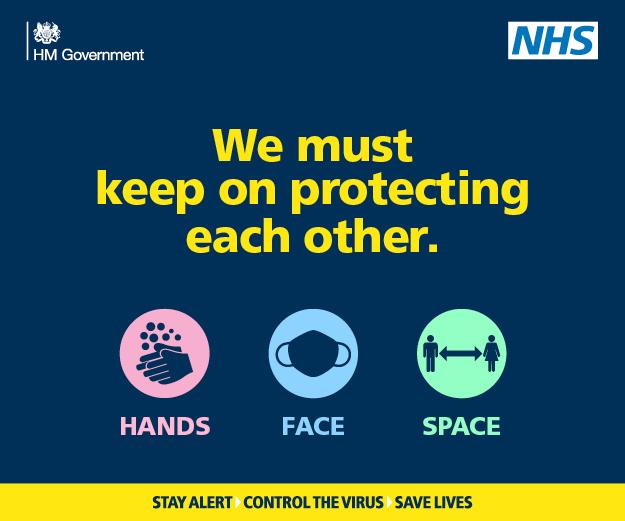
Be Fuel Poverty Aware this Winter, advice from Herefordshire Council and the current offers available throughout the county.
Click on the link below for full details :
Be fuel poverty aware this winter
Covid Local Alert Level for Herefordshire
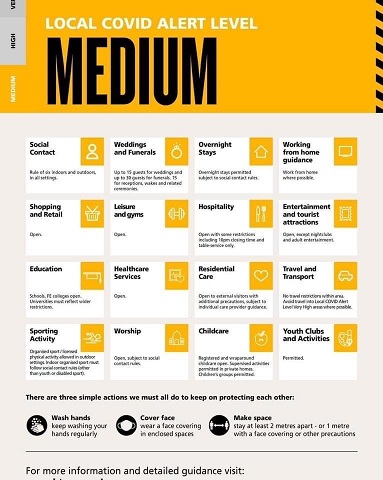
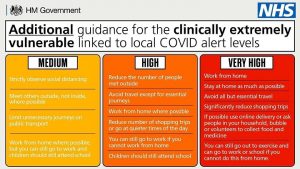
Download the NHS Covid 19 app on your phone.
It’s the fastest way of knowing when you’re at risk from coronavirus
Friends Against Scams –
Anyone can be the victim of a scam, however some people are more vulnerable to scams and criminals will use this to their advantage.
Help to manage finances and avoid scams for people at risk and those who support them. A guide has been prepared by the National Trading Standards Scams Team and the National Centre for Post Qualifying Social Work and Professional Practice at Bournemouth University, working in partnership with Lloyds Bank, Halifax and Bank of Scotland.
Click on the link below to find out more about the support and guidance that is out there :
https://www.friendsagainstscams.org.uk/article/545/world_alzheimer_s_day_action_on_scams
Coronavirus: Social gatherings above six banned in England from 14 September
A law change will ban larger groups meeting anywhere socially indoors or outdoors, the government said.
But it will not apply to schools, workplaces or Covid-secure weddings, funerals and organised team sports.
It will be enforced through a £100 fine if people fail to comply, doubling on each offence up to a maximum of £3,200.
Several exemptions apply to the new rules – which come into force on 14 September – with households and support bubbles bigger than six people unaffected.
BBC NEWS update click on link for more information – https://www.bbc.co.uk/news/uk-54081131
Courier Fraud – Urgent information from West Mercia Police
Fraudsters are back in action claiming to be from the police, banks and fraud squads in order to extort money from the vulnerable.
There have been a couple of incidents in Hereford where couples in their eighties have been targeted.
One man was conned into withdrawing an amount of cash from his personal bank account after being told his credit cards had been cloned. They then sent out two separate couriers to collect the cash from his home address.
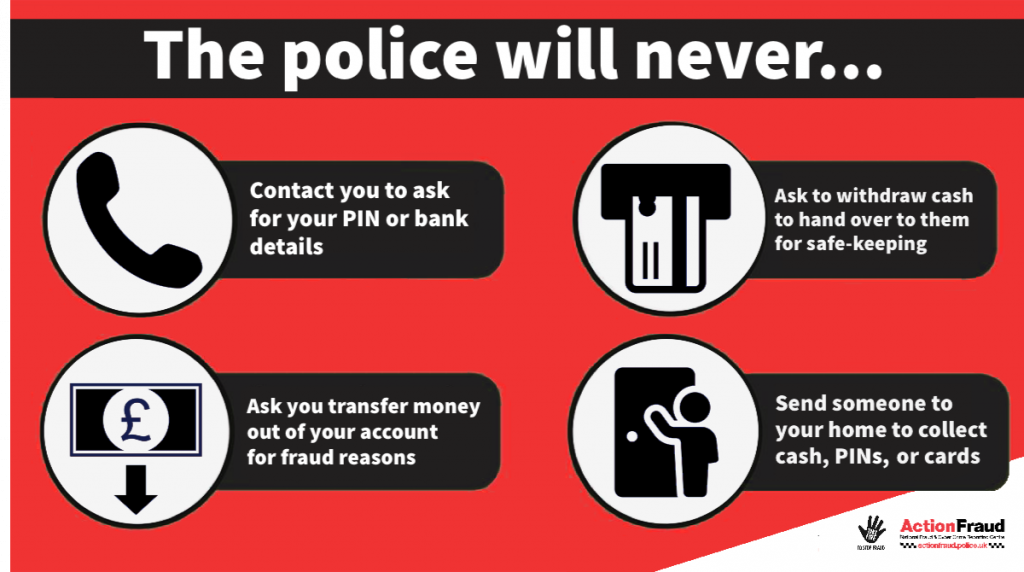
In a second incident they asked for an amount of cash which has been collected by a “courier”. Before the individual was about to send over a much larger amount of cash West Mercia Police officers were able to step in and offer the support needed to the victim and prevent the transaction taking place.
UPDATE: Virus isolation period extended from 7- 10 Days
The self-isolation period has been extended to 10 days for those in the community who have coronavirus (COVID-19) symptoms or a positive test result.
In symptomatic people COVID-19 is most infectious just before, and for the first few days after symptoms begin. It is very important people with symptoms self-isolate and get a test, which will allow contact tracing.
Evidence, although still limited, has strengthened and shows that people with COVID-19 who are mildly ill and are recovering have a low but real possibility of infectiousness between 7 and 9 days after illness onset.
We have considered how best to target interventions to reduce risk to the general population and consider that at this point in the epidemic, with widespread and rapid testing available and considering the relaxation of other measures, it is now the correct balance of risk to extend the self-isolation period from 7 to 10 days for those in the community who have symptoms or a positive test result.
This will help provide additional protection to others in the community. This is particularly important to protect those who have been shielding and in advance of the autumn and winter when we may see increased community transmission.
Chief Medical Officer for England, Professor Chris Whitty
Chief Medical Officer for Northern Ireland, Dr Michael McBride
Chief Medical Officer for Scotland, Dr Gregor Smith
Chief Medical Officer for Wales, Dr Frank Atherton
It is important to self-isolate and get a test if you have any of the following symptoms:
- A high temperature – this means you feel hot to touch on your chest or back (you do not need to measure your temperature
- A new, continuous cough – this means coughing a lot for more than an hour, or 3 or more coughing episodes in 24 hours (if you usually have a cough, it may be worse than usual)
- A loss or change to your sense of smell or taste – this means you’ve noticed you cannot smell or taste anything, or things smell or taste different to normal
If you have symptoms, get a test to check if you have coronavirus as soon as possible.
The test needs to be done in the first 5 days of having symptoms.
Link: Get a test to check if you have coronavirus
- How to self-isolate:
You must not leave your home if you’re self-isolating.
Don’t
- do not go to work, school or public places – work from home if you can
- do not go on public transport or use taxis
- do not go out to get food and medicine – order it online or by phone, or ask someone to bring it to your home
- do not have visitors in your home, including friends and family – except for people providing essential care
- do not go out to exercise – exercise at home or in your garden, if you have one
Get an isolation note for your employer if you’re unable to work
If you need to self-isolate, you can get an isolation note to send to your employer as proof you need to be off work.
You do not need to get a note from a GP.
Link: Get an isolation note
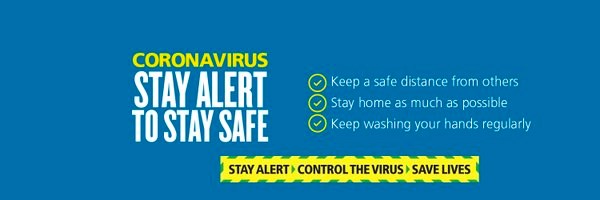
Government Announcement: Compulsory to wear face coverings in shops in England from 24 July
If you have an underlying health condition that makes it impossible for you to wear a face covering, please see link below. The medical conditions which are exempt from having to comply with wearing a mask are wide and include diabetes and asthma.https://hiddendisabilitiesstore.com/hidden-disabilities-face-covering.html
SIL is happy to submit a bulk order, so if you have a medical condition and would like a card, please contact HR who will order one on your behalf.

Important information regarding face masks for children
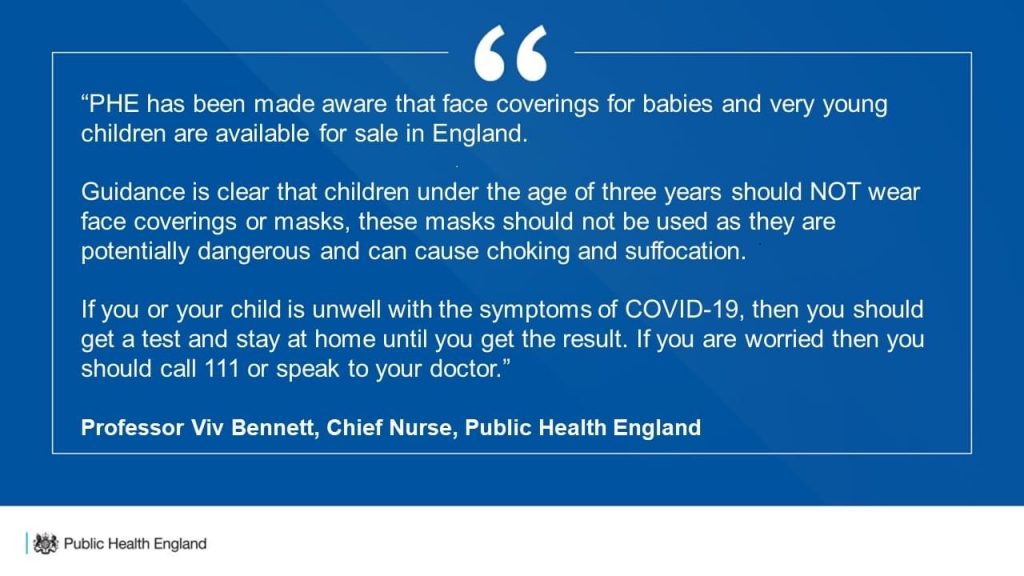
Advice from the NHS
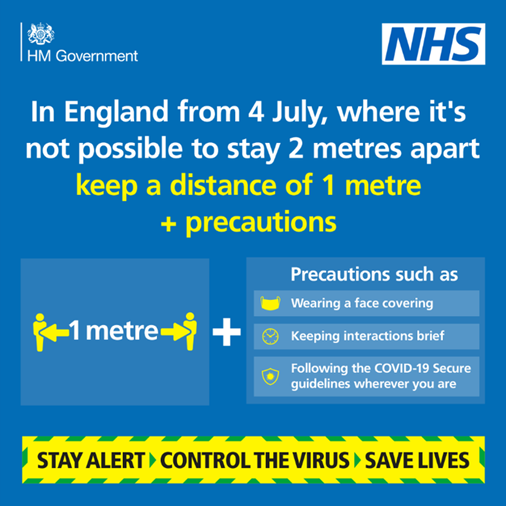
Latest Advice from Welsh Government
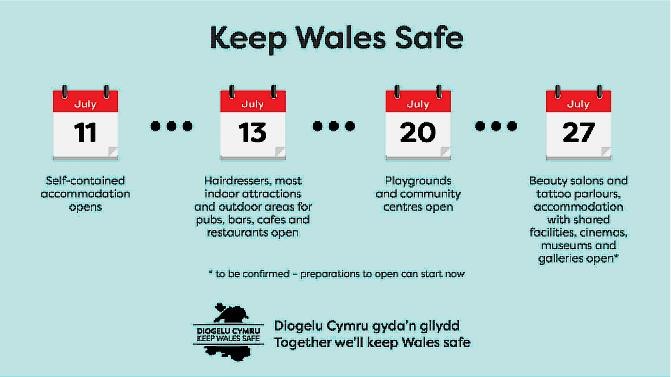
For the latest updates from the Welsh Government on their position regarding covid 19 go to: gov.wales/coronavirus
Please click on the link/download at the bottom of the page to view PPE guide for community health and social care settings:
What PPE to wear and when – an illustrative guide
Holiday information
Holidays in the UK : https://www.bbc.com/news/explainers-52646738


Where can I go without quarantining when I get back?
Passengers entering the UK from dozens of countries no longer have to quarantine.
More than 50 countries – including many popular holiday spots – now pose ”a reduced risk” from coronavirus, the government says.
The list focuses on countries in Europe, island nations around the world including the Caribbean, and countries further east – including Vietnam, Japan, South Korea, Hong Kong, Australia and New Zealand.
Arrivals are exempt from quarantine if they arrive in England, Wales and Northern Ireland from:
Antigua and Barbuda, Aruba, Australia, Austria, Barbados, Bonaire, Sint Eustatius and Saba, Croatia, Curaçao, Cyprus, Czech Republic, Denmark, Dominica, Faroe Islands, Fiji, Finland, France, French Polynesia, Germany, Greece, Greenland, Grenada, Guadeloupe, Hong Kong, Hungary, Iceland, Italy, Jamaica, Japan, Liechtenstein, Lithuania, Luxembourg, Macau, Malta, Mauritius, Monaco, Netherlands, New Caledonia, New Zealand, Norway, Poland, Réunion, San Marino, Seychelles, South Korea, St Barthélemy, St Kitts and Nevis, St Lucia, St Pierre and Miquelon, Switzerland, Taiwan, Trinidad and Tobago, Turkey, Vatican City, Vietnam.
From 28 July 2020 passengers arriving from Estonia, Latvia, Slovakia, Slovenia and St Vincent and the Grenadine will not need to self-isolate.
Coronavirus update 07.08.2020: Belgium, Andorra, and Bahamas added to UK quarantine list https://www.bbc.co.uk/news/uk-53687740
The 14 British Overseas Territories are also exempt.
The government has been advising against all but essential travel since March, but this advice has been lifted for destinations that ”no longer pose an unacceptably high risk” for British travellers.
Health measures like quarantine are set by each UK nation separately.
Wales and Northern Ireland have introduced quarantine exemptions for the same countries as England. Scotland is also allowing exemptions, and has updated its own list of countries with which it is now allowing travel without quarantine
Coronavirus (COVID-19): getting tested
www.gov.uk/guidance/coronavirus-covid-19-getting-tested
Do not go to places like a GP surgery, pharmacy or hospital if you think you might have coronavirus. Stay at home.
Update on coronavirus symptoms
The official guidance states that people must self-isolate and get tested if they can; if they develop a new continuous cough or high temperature or anosmia – loss/change in sense of smell or taste.
Tests are now available for anyone over 5 years old with these symptoms.
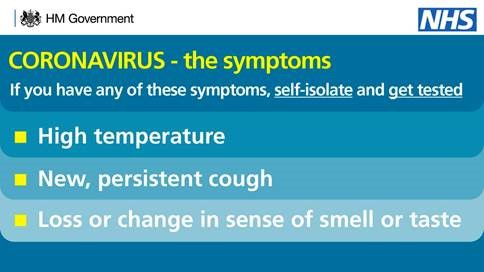
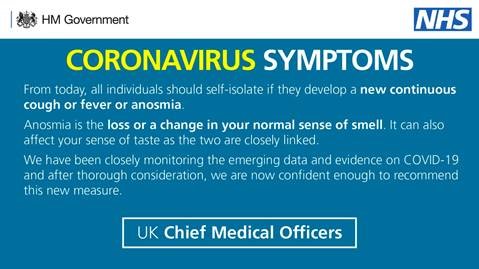
Urgent advice:
Use the 111 online coronavirus service if you have either:
- a high temperature – this means you feel hot to touch on your chest or back (you do not need to measure your temperature)
- a new, continuous cough – this means coughing a lot for more than an hour, or 3 or more coughing episodes in 24 hours (if you usually have a cough, it may be worse than usual)
These are the main symptoms of coronavirus.
The 111 online coronavirus service will ask about your symptoms and tell you what to do.Use the 111 online coronavirus service
Only call 111 if you cannot get help online.
Babies and children
Call 111 if you’re worried about a baby or child.
If they seem very unwell, are getting worse, or you think there’s something seriously wrong, call 999.
Do not delay getting help if you’re worried. Trust your instincts.
Get more advice about coronavirus in children.
Staying at home if you have symptoms (self-isolation)
If your symptoms are mild, you’ll usually be advised to not leave your home for at least 7 days.
Anyone you live with should not leave your home for 14 days.
This is called self-isolation.
Find out more about self-isolation if you or someone you live with has coronavirus symptoms.
Even you do not have Coronavirus symptoms you must stay at home
- Only go outside for food, health reasons or work (but only if you cannot work from home)
- If you go out, stay 2 metres (6ft) away from other people at all times
- Wash your hands as soon as you get home
Do not meet others, even friends or family. You can spread the virus even if you don’t have symptoms.
Providing person-centred support for people living with dementia at home during the Covid-19 Crisis
This information sheet download below has been developed by the Association for Dementia Studies at the
University of Worcester (www.worc.ac.uk/dementia) to help formal caregivers of people living with dementia at home during this difficult time.
Any change to normal routine can be very stressful for a person living with dementia at the best of times; even more so during this crisis. This guidance aims to help you reduce this stress and be person-centred during this challenging time.
Is someone in your household learning to drive? Can you start driving lessons again ?
Click the link below for guidance:
https://www.bbc.co.uk/news/world-asia-china-51176409
